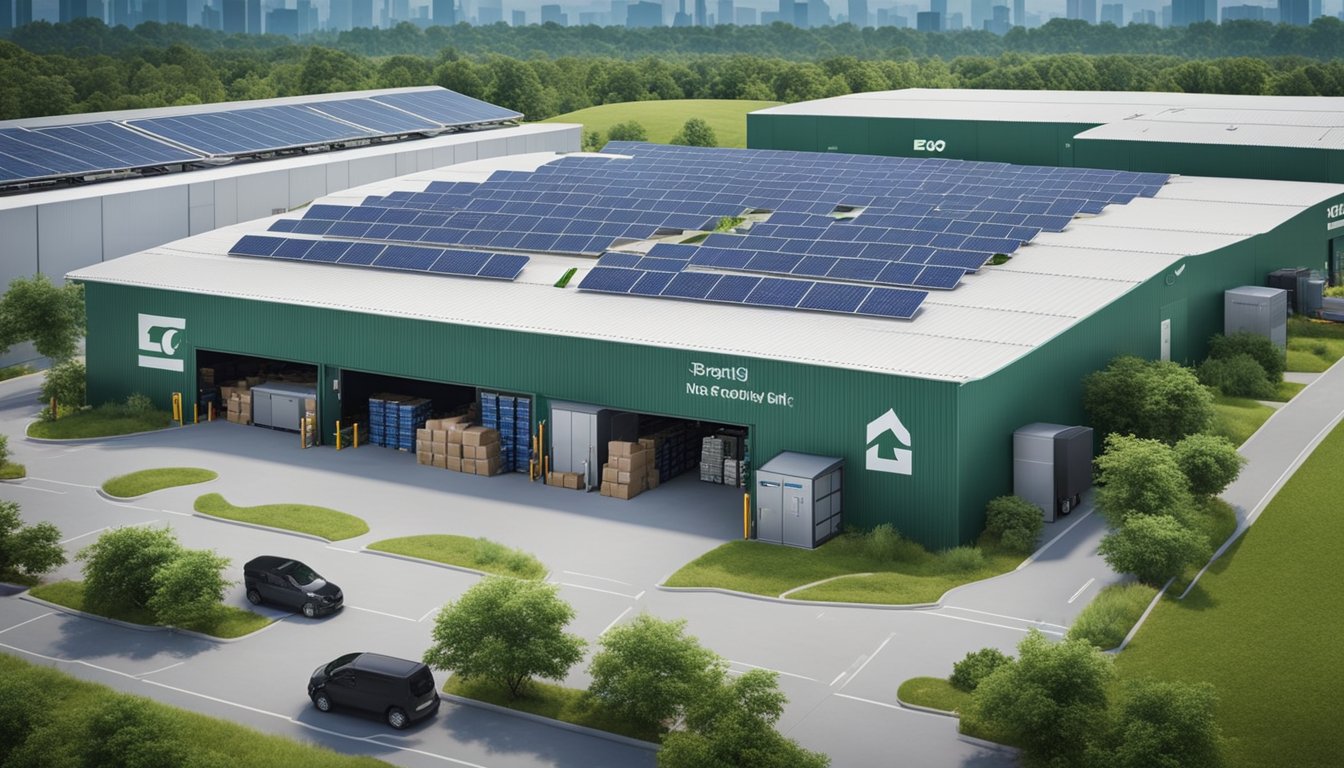Late updated: 31 Jul 2024 09:07
Written by: Amber Collins
Business Benefits Of Adopting Green Logistics: Boost Efficiency and Sustainability
Adapting green logistics in our business practices offers a wealth of advantages. Adopting green logistics not only slashes costs but also boosts our reputation and operational efficiency. By integrating sustainable logistics, we optimise transportation routes, decrease reliance on fossil fuels, and employ electric vehicles to reduce carbon footprints. This not only lessens our environmental impact but also attracts environmentally-conscious customers.

Our journey towards green logistics goes beyond environmental benefits. Sustainable practices in our supply chain lead to lower operational costs through fuel efficiency and reduced waste. Smart investments in green warehousing and Warehouse Management Systems enhance our productivity, ensuring that we stand resilient in an ever-competitive market.
The shift towards green logistics can transform our business landscape. As global awareness around climate change intensifies, companies like ours implementing eco-friendly logistics solutions gain a competitive edge. Embracing sustainable logistics signifies our commitment to the planet, helping us build a strong, reputable brand that appeals to eco-centric consumers while positioning us as leaders in sustainability.
Key Takeaways
- Green logistics cuts costs and enhances company reputation.
- Sustainable logistics improve operational efficiency.
- Green warehousing and management systems boost productivity.
Understanding Green Logistics and Its Significance
Green logistics, also known as sustainable logistics, focuses on minimising the environmental impact of transportation and supply chain activities while promoting eco-friendly practices. This approach benefits both the environment and businesses by addressing climate change and enhancing operational efficiency and cost savings.
Defining Green and Sustainable Logistics
Green logistics emphasises reducing the carbon footprint of supply chain activities. This includes lowering greenhouse gas emissions through the use of renewable energy and eco-friendly transportation methods, such as electric vehicles. Sustainable logistics also promotes efficient use of resources and waste reduction, which contributes to a cleaner and greener environment.
Key Components:
- Eco-friendly transportation
- Electric and hybrid vehicles
- Optimised routing and scheduling
- Renewable energy sources
- Solar-powered facilities
- Energy-efficient warehouses
- Waste reduction
- Recycling initiatives
- Zero-waste policies
The Environmental and Social Imperative
Addressing the environmental impact of logistics has become crucial in our fight against climate change. By switching to sustainable practices, businesses can significantly lower their carbon emissions. This, in turn, helps reduce air and water pollution, safeguarding the health of communities and ecosystems.
Green logistics also enhances public health by improving air quality, which reduces respiratory and cardiovascular diseases. Moreover, sustainable logistics practices foster social responsibility and align businesses with global efforts to tackle climate change.
The Business Case for Sustainability in Supply Chains
Adopting green logistics practices not only supports environmental goals but also makes sound business sense. Energy efficiency measures and waste reduction can lead to substantial cost savings. For instance, optimised fuel consumption and reduced material wastage can enhance operating profits.
Furthermore, eco-friendly logistics can elevate a company's brand reputation. Consumers are progressively valuing sustainability, making it a competitive advantage. Companies can attract and retain customers who are environmentally conscious, thereby driving long-term growth.
Business Benefits:
- Cost savings
- Reduced fuel and energy costs
- Decreased waste disposal expenses
- Brand reputation
- Enhanced public image
- Increased customer loyalty
- Regulatory compliance
- Meeting environmental standards
- Avoiding potential fines and penalties
By integrating these practices, businesses can thrive while contributing positively to the planet.
Strategies for Implementing Green Logistics

Implementing green logistics involves various strategic actions aimed at reducing carbon emissions, improving energy efficiency, and promoting eco-friendly practices throughout the supply chain. These strategies include optimising transport and fleet management, adopting energy-efficient warehousing solutions and innovative technologies, and focusing on waste reduction.
Transport and Fleet Optimisation
Optimising transport and fleet operations is crucial in reducing fuel consumption and mitigating carbon emissions. Using route planning software helps in identifying the most efficient routes, thereby minimising travel distance and time.
Investing in electric vehicles and alternative fuels such as biofuel can significantly cut down greenhouse gas emissions. Collaborating with other companies to share transportation resources can also improve load efficiency and reduce the number of trips required.
Energy-Efficient Warehousing and Storage Solutions
Energy management within warehouses is vital in achieving operational efficiency. Implementing energy-efficient solutions such as LED lighting and advanced climate control systems greatly reduces energy consumption.
Installing solar panels can harness renewable energy, leading to substantial savings in electricity costs. A Warehouse Management System (WMS) improves inventory management, thus reducing the need for excessive storage space and contributing to an overall lower energy footprint.
Waste Reduction Through Recycling and Sustainable Packaging
Reducing waste by incorporating recycling practices is essential. Companies can implement stringent waste management systems to sort and recycle materials effectively. Utilising sustainable packaging materials, such as biodegradable plastics or reusable containers, plays a significant role in minimising environmental impact.
Encouraging suppliers and customers to return packaging for reuse can create a circular economy, further reducing the waste generated throughout the supply chain.
Innovative Technologies and Renewable Energy Adoption
The adoption of cutting-edge technologies is pivotal in promoting green logistics. Investing in energy management systems (EMS) helps in real-time monitoring and optimisation of energy use across the logistics network.
Using renewable energy sources, such as wind and solar power, ensures that logistics operations are sustainable. Automation and Internet of Things (IoT) technologies enhance accuracy and efficiency, reducing operational costs and the overall carbon footprint.
Frequently Asked Questions

Integrating green logistics can bring a myriad of benefits to a business, from cost savings to enhanced brand reputation. Below, we address some common inquiries regarding the advantages of adopting sustainable logistics practices.
What advantages does a company gain from integrating sustainable logistics practices?
By integrating sustainable logistics practices, companies can significantly reduce their environmental impact. This results in lower carbon emissions, reduced waste, and improved energy efficiency. Additionally, businesses may experience increased operational efficiency and innovation.
How can implementing green logistics impact an organisation's bottom line?
Implementing green logistics can lead to substantial cost savings. Energy-efficient technologies and waste reduction strategies help lower operational costs. Moreover, focusing on fuel efficiency reduces transportation expenses. These combined efforts can significantly enhance profit margins.
In what ways can environmental sustainability enhance a business's operations and customer perception?
Investing in green logistics positively influences customer perception by aligning the brand with eco-friendly values. Environmentally conscious consumers are more likely to support companies with sustainable practices. Operationally, enhanced efficiencies and reduced waste contribute to smoother processes.
What financial incentives are associated with the transition to green supply chain management?
Governments and local authorities often offer tax breaks, grants, and subsidies for businesses that adopt green practices. These financial incentives can offset initial investment costs for sustainable technologies and measures. Additionally, companies may benefit from lower long-term operational costs.
How does adopting eco-friendly logistics practices contribute to corporate responsibility?
Adopting eco-friendly logistics practices showcases a company's commitment to social and environmental responsibility. It demonstrates proactive efforts to minimise negative impacts on the planet. This commitment can strengthen stakeholder relationships and provide a competitive edge in the market.
What are the long-term operational benefits for businesses that move towards greener logistics?
Long-term benefits include sustained cost savings from energy-efficient solutions and waste reduction. Companies also benefit from enhanced regulatory compliance and reduced risk of environmental penalties. Ultimately, greener logistics lead to a more resilient and adaptable supply chain.
